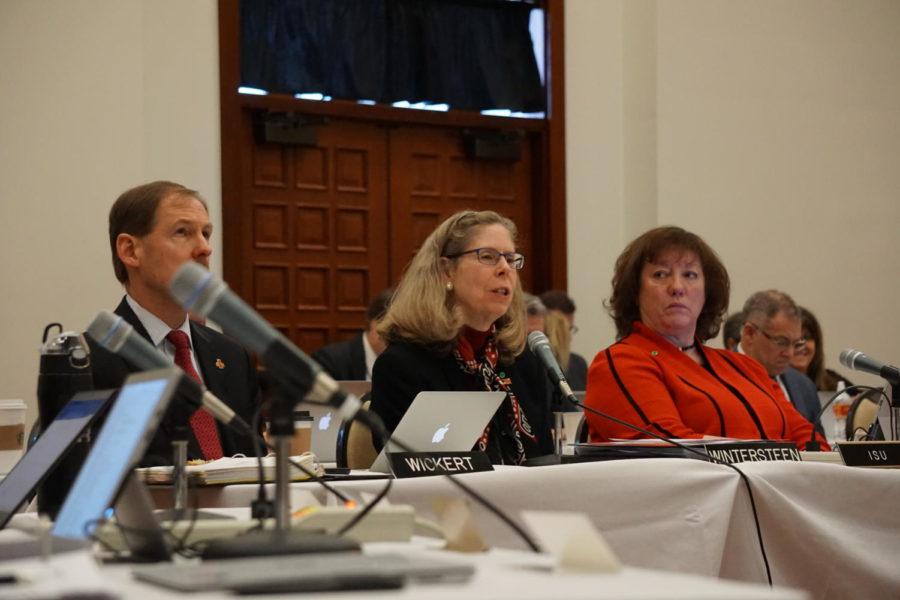- App Content
- App Content / News
- News
- News / Politics And Administration
- News / Politics And Administration / Campus
- News / Politics And Administration / City
Regents propose 3.8 percent tuition increase for Iowa State undergraduates
Iowa State President Wendy Wintersteen speaks to the board about the new and different things Iowa State has begun to implement to make the school function better and more economically during the Board of Regents meeting Feb. 22.
April 3, 2018
An increase of 3.8 percent to Iowa State University undergraduates has been proposed for the upcoming academic year, as outlined by the Iowa Board of Regents.
Included in the agenda for the upcoming Regents meeting April 12, the board will consider the proposed increases which are scheduled for final approval at the June 2018 meeting.
Currently, Iowa State undergraduate students pay $7,457 in mandatory tuition and fees. For resident students, an increase of 3.8 percent is about $284. For non-resident students, however, its $852.
The University of Iowa, if approved in its current form by the Regents, would also see a 3.8 percent tuition increase. The University of Northern Iowa would see a smaller increase, however, of 2.8 percent.
The proposal comes just a week after Gov. Kim Reynolds approved $10.9 million in midyear cuts to the Iowa Board of Regents that will be absorbed by both Iowa State and the University of Iowa.
According to the tuition proposal, the Iowa Regents requested an appropriation increase for Fiscal Year 2019 of $12 million that would “be used for financial aid to resident undergraduate students.” However, the Iowa Legislature has yet to approve the funding levels for the upcoming fiscal year.
The tuition proposal outlined by the Regents also comes nearly nine months after interim Iowa State President Ben Allen outlined in August a 7 percent undergraduate tuition increase each year for five years.
From there, the Regents were originally expected to announce a proposal in October but postponed doing so in an effort to avoid multiple tuition increase in one year.
A proposal was also expected in February, too, but the Regents delayed that decision because of the “considerable uncertainty about state appropriations.”
Student Government President-elect Julian Neely said that while it would have been better for students and families to know the proposed tuition increase sooner, he sees it as a fault of the Iowa Legislature for disinvesting in higher education.
“Now, we have to develop an action plan to [help] legislators understand the importance of education,” he said. “We need to refocus our distribution of funds in the state.”
Neely said that when speaking with the Regents at the next meeting on April 11 and April 12, a big piece of the conversation will be asking if the increase is needed, as well as highlighting the impact it has on the Iowa State community.
Raising concerns of retention, Neely pointed to a last-minute tuition increase as putting students in a tricky situation because it increases their financial need yet funding options, such as scholarships, have already passed.
Also submitted to the Regents for approval are differential tuition rates for specific graduate programs at Iowa State.







